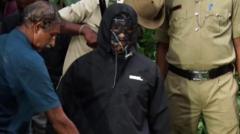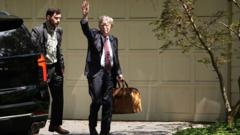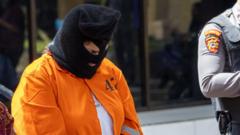The sensational allegations made by a former temple cleaner in the southern Indian town of Dharmasthala have led to his arrest on charges of perjury. The man, whose identity remains concealed, claimed to have buried numerous women who he alleged were raped and killed, stirring controversy in a town known for its religious significance. A Special Investigation Team (SIT) has been formed to unpack these serious accusations, which have ignited political debates and media scrutiny.
Temple Cleaner's Shocking Allegations Lead to Arrest in Dharmasthala Scandal

Temple Cleaner's Shocking Allegations Lead to Arrest in Dharmasthala Scandal
A former temple cleaner claims he was forced to bury victims of rape and murder, triggering a major investigation.
In a shocking turn of events, the police have arrested a man who alleged that he was compelled to bury the bodies of numerous women who were said to have been sexually assaulted and murdered. His claims have left the small temple town of Dharmasthala in Karnataka, India, in a state of upheaval. The area is famous for the ancient temple of Manjunatha Swamy, a revered site that attracts worshippers from far and wide.
The man's accusations prompted state officials to create a Special Investigation Team (SIT) to thoroughly assess the validity of his statements. An SIT member, who preferred to remain anonymous, announced on Saturday that the suspect had been taken into custody on charges of providing false testimony. In July, the man filed a police complaint, detailing his purported experiences as a temple cleaner from 1995 to 2014 and asserting that he had buried the remains of countless young women, including minors.
While the cleaner did not identify any specific individuals in his claims, he implicated the temple's administration. However, the temple authorities have adamantly refuted his statements, labeling them as “unfounded.” The man appeared before a magistrate wearing all black and produced a human skull, claiming it belonged to one of the bodies he had interred; a claim the SIT later disputed, stating that the remains did not originate from the specified burial sites.
The unfolding accusations have sparked widespread media attention and engendered discussions within the local government. Government officials launched a thorough investigation and excavated several identified sites in Dharmasthala. Preliminary findings included human remains—approximately a hundred bone fragments—which have been sent for forensic analysis, although their origins remain uncertain.
The claims have also cast a shadow on the influential Heggade family, who manage the temple. Veerendra Heggade, a prominent figure and a recipient of one of India's highest civilian honors, responded to the allegations by expressing the temple’s commitment to cooperating with the SIT's investigation. He characterized the cleaner's claims as "impossible" and expressed hope that the truth would come to light.
As political tensions rise, the issue has ignited intense debates within the state assembly, with some opposing members terming the allegations a "smear campaign" against the temple—a site cherished by millions of devotees. Home Minister G Parameshwara emphasized the government's neutrality, asserting that the integrity of the investigation holds utmost importance to uphold justice and reinforce Dharmasthala's esteemed status.
The man's accusations prompted state officials to create a Special Investigation Team (SIT) to thoroughly assess the validity of his statements. An SIT member, who preferred to remain anonymous, announced on Saturday that the suspect had been taken into custody on charges of providing false testimony. In July, the man filed a police complaint, detailing his purported experiences as a temple cleaner from 1995 to 2014 and asserting that he had buried the remains of countless young women, including minors.
While the cleaner did not identify any specific individuals in his claims, he implicated the temple's administration. However, the temple authorities have adamantly refuted his statements, labeling them as “unfounded.” The man appeared before a magistrate wearing all black and produced a human skull, claiming it belonged to one of the bodies he had interred; a claim the SIT later disputed, stating that the remains did not originate from the specified burial sites.
The unfolding accusations have sparked widespread media attention and engendered discussions within the local government. Government officials launched a thorough investigation and excavated several identified sites in Dharmasthala. Preliminary findings included human remains—approximately a hundred bone fragments—which have been sent for forensic analysis, although their origins remain uncertain.
The claims have also cast a shadow on the influential Heggade family, who manage the temple. Veerendra Heggade, a prominent figure and a recipient of one of India's highest civilian honors, responded to the allegations by expressing the temple’s commitment to cooperating with the SIT's investigation. He characterized the cleaner's claims as "impossible" and expressed hope that the truth would come to light.
As political tensions rise, the issue has ignited intense debates within the state assembly, with some opposing members terming the allegations a "smear campaign" against the temple—a site cherished by millions of devotees. Home Minister G Parameshwara emphasized the government's neutrality, asserting that the integrity of the investigation holds utmost importance to uphold justice and reinforce Dharmasthala's esteemed status.



















